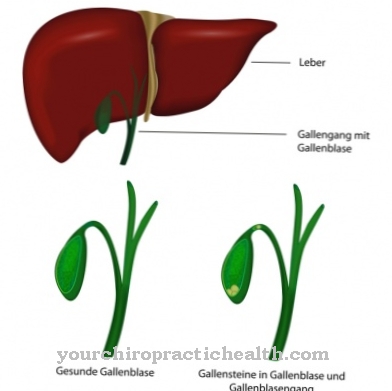It is well known that alcohol and tobacco are dangerous for the unborn child and should therefore be taboo during pregnancy. It goes without saying that medication should only be taken after consulting a doctor. But also the seemingly harmless enjoyment of Coffee during pregnancy can negatively affect the baby.
What does caffeine do in the placenta?
The caffeine contained in coffee, but also in black and green tea, cola, energy drinks and, to a lesser extent, cocoa is a psychoactive substance that has a stimulating effect on the body. Since caffeine increases the heart rate and stimulates the metabolism, the coffee wakes you up and increases concentration, but in larger quantities it also causes headaches and sleep problems.
While many other harmful substances are filtered out by the placenta, which separates the maternal from the child's bloodstream, caffeine can cross the placental barrier unhindered. That is why the enjoyment of Coffee during pregnancy not only the organism of the expectant mother, but also that of her unborn child. The effect on the baby is even intensified by the fact that the child's body lacks important enzymes that make it easier for adults to break down caffeine.
Caffeine can build up, especially in the child's brain tissue. It takes the unborn child up to twenty times as long as the average adult to excrete the caffeine it has absorbed. The body of the pregnant woman itself can only break down caffeine more slowly due to the changes in her metabolism.
In addition to the direct effects on the growing child, the intake of caffeine also affects the placenta, as it constricts the blood vessels. This leads to a reduced blood flow and, indirectly, to a lower supply of the baby with oxygen and important nutrients.
Too much coffee affects the child's weight
The more coffee an expectant mother consumes, the more the caffeine it contains affects the child's development. In addition to the reduced supply of nutrients, the direct growth-inhibiting effects of caffeine also play a role. Even comparatively low coffee consumption can therefore have a causal connection with a reduced birth weight of the child.
Just one cup of coffee a day can mean a deviation from the average birth weight of 30 grams. The height can also be below average. The less an infant weighs at birth, not only the greater the health hazards in the time immediately after birth, but the more likely it will be long-term consequences that can affect the child's development.
For this reason, international health organizations recommend pregnant women not to consume more than 200 to 300 milligrams of caffeine per day. This corresponds to about two to three small cups of coffee. If the daily dose is only occasionally higher, negative effects are unlikely. However, if significantly more coffee is consumed over the long term, the reduced birth weight also increases the risk of premature birth.
Coffee while breastfeeding?
Coffee should only be consumed in moderation while breastfeeding. The substance can be detected in breast milk shortly after ingesting caffeine with drinks or food. About an hour later, the caffeine content is highest. If a baby is made to drink during this time, it will therefore ingest caffeine with the milk.
The more caffeine there is in breast milk, the more often and more strongly babies react to it with sleep disorders, restlessness and nervousness. However, the mother's metabolism normalizes very quickly after the end of pregnancy, so that the caffeine ingested is soon broken down again at the rate that was usual before pregnancy.
As soon as a baby is breastfed for a longer period of time, there is nothing wrong with drinking coffee immediately after breastfeeding, as the caffeine contained in it is already broken down in the body by the time the child is next put on.
Tips for a balanced caffeine consumption
Since small amounts of caffeine are harmless, no pregnant or breastfeeding woman has to forego coffee entirely. However, if possible, the two to three permitted cups should not be drunk all at once, but distributed throughout the day. It should also be remembered that other beverages such as black tea or cola also contain caffeine and must therefore be taken into account in the overall balance.
If coffee and cola are mainly consumed because of the taste, it is advisable to switch to decaffeinated products. Black tea can be replaced with rooibos tea, which also contains no caffeine. Instant coffee beverages, on the other hand, are not an alternative because they also contain caffeine and are often quite high in calories.
If a woman appreciates coffee primarily because of its perking effect and has drank a lot of it before pregnancy, fatigue and headaches can occur during the transition phase. However, this goes away by itself after a few days after the body has adjusted.
If you have particularly severe problems getting used to it, the daily amount of coffee can be gradually reduced. Instead of coffee, hot lemon, ginger lemonade, freshly squeezed juices or alternating showers can be used as morning pick-me-ups. Fruit tea can also be delicious and refreshing.
Enjoyment without regrets
For many, drinking coffee is a natural part of everyday life. Even during pregnancy and breastfeeding, this habit does not have to be given up entirely. However, since larger amounts of caffeine can have an unfavorable effect on the development of the unborn child, consumption should be reduced accordingly.
Thanks to numerous caffeine-free drinks in a wide variety of flavors, even passionate coffee drinkers are sure to find something they can enjoy without hesitation.
























.jpg)



